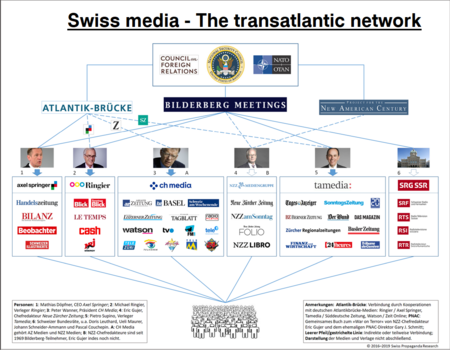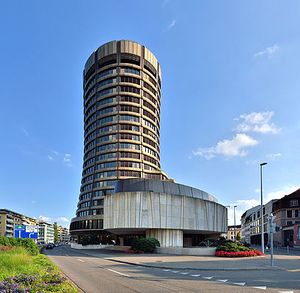Difference between revisions of "Switzerland/Deep state"
m (sketching headlines) |
(P26 false flag) |
||
| Line 32: | Line 32: | ||
==Gladio== | ==Gladio== | ||
During the [[Cold War]], Switzerland had a stay-behind network. | During the [[Cold War]], Switzerland had a stay-behind network. | ||
| + | |||
| + | [[Daniele Ganser]] believes P26 might have been behind two [[false flag attacks]] in the [[Basel]] region, with the intent to discredit opponents of [[nuclear power]], similar [[The Bombers Affair (Luxembourg)|to what happened in Luxemburg]]. On January 30, 1983, after the [[Swiss Federal Council|Federal Council]] had voted yes to the Kaiseraugst [[nuclear power plant]], an anonymous group mounted explosive charges on two high-voltage lines in Rheinfelden and Pratteln. The charge did not go off in Rheinfelden, in Pratteln it destroyed a corner mast. "It would be worth examining these attacks again today for the possibility of state terrorism," said Ganser in 2013. After the attacks, the then president of "Never Again Atomic Power Plants", [[Alexander Euler]], expressed the suspicion that it could have been a targeted provocation to discredit the opponents of the nuclear power plant. | ||
| + | |||
| + | The theory made it into parliament: In March [[1991]], [[Social Democratic Party of Switzerland|SP]] Councilor [[Esther Bührer]] wanted to know from the Federal Council whether the [[P-26]] had been involved in the attacks. Federal Councilor [[Kaspar Villiger]] answered on June 10, [[1991]]: "There is no evidence whatsoever of a connection between the (...) P-26 and the unsolved attacks on plants in the energy industry," saying the explosives technology used had already been described in the early [[1960s]] in the defense publication "Total Resistance" and was therefore generally known.<ref>https://tageswoche.ch/politik/der-schatten-der-geheimen-armeen-reicht-bis-ins-heute/index.html</ref> | ||
| + | |||
| + | It is known that a high-ranking intelligence officer infiltrated the anti-nuclear power movement in the [[1980s]]. He gathered information, and also worked to create discord between the Swiss activists and their [[West-German]] friends.<ref>https://swprs.org/wp-content/uploads/2023/01/sses-im-visier-der-bundespolizei-2014.pdf</ref> | ||
==Media== | ==Media== | ||
| − | [[image:Medien-netzwerk-schweiz.png|thumb|left|450px|Swiss media is dominated by a [[deep state network]] of leading journalists and editors. Names include [[Mathias Döpfner]], [[Michael Ringier]], [[Eric Gujer]], [[Pietro Supino]], Swiss members of government [[Doris Leuthard]], [[Ueli Maurer]], [[Johann Schneider-Ammann]] and [[Pascal Couchepin]].]] | + | [[image:Medien-netzwerk-schweiz.png|thumb|left|450px|Swiss media is dominated by a [[deep state network]] of leading journalists and editors. Names include [[Mathias Döpfner]], [[Michael Ringier]], [[Eric Gujer]], [[Pietro Supino]], Swiss members of government [[Doris Leuthard]], [[Ueli Maurer]], [[Johann Schneider-Ammann]] and [[Pascal Couchepin]]. ([[Swiss Policy Research|SPR]])]] |
The CEO of the NZZ media group, [[Felix R. Graf]], and the former SRG general director, [[Roger de Weck]], are both Young Global Leaders of the [[World Economic Forum]] (WEF). [[SRF]] moderator [[Arthur Honegger]] as well as the [[NZZ]] correspondents [[Niklaus Nuspliger]] and [[Marie-Astrid Langer]] are Young Leaders of the [[American Swiss Foundation]].<ref name=swprs>https://swprs.org/netzwerk-medien-schweiz/</ref> | The CEO of the NZZ media group, [[Felix R. Graf]], and the former SRG general director, [[Roger de Weck]], are both Young Global Leaders of the [[World Economic Forum]] (WEF). [[SRF]] moderator [[Arthur Honegger]] as well as the [[NZZ]] correspondents [[Niklaus Nuspliger]] and [[Marie-Astrid Langer]] are Young Leaders of the [[American Swiss Foundation]].<ref name=swprs>https://swprs.org/netzwerk-medien-schweiz/</ref> | ||
Revision as of 22:14, 5 January 2023
(Deep state) | |
|---|---|
| Headquarters | Switzerland |
| Exposed by | Dino Bellasi |
| Switzerland is the place for significant deep state activities | |
Switzerland is the centre for many international deep state activities. In addition, its own deep state keep control over the country.
Contents
The few families
Nominally having one of the most democratic forms of government in the world, Switzerland is in fact run by a network of a few dozen very rich families who control the large Swiss companies. [citation needed] This control has been diluted since the event of globalization, especially since its acceleration in the 1990s.
Functions
Banking
- Full article: Bank of International Settlements
- Full article: Bank of International Settlements
The Bank of International Settlements (the central bankers' central bank) is based in Basel, Switzerland.
Multinational corporations
Switzerland is home to some of the largest global companies, with one of the highest concentrations of Fortune 500 companies.[1] The Swiss deep state will defend the interests of these corporations, by persecuting whistleblowers.
Rive-Reine-Conference
The Rive-Reine-Conference is a secretive elite get-together arranged by the multinational corporation Nestlé.
Intelligence services
Switzerland joined a partnership with NATO in 1996, the so -called "Partnership for Peace"; Since 2018, the Swiss intelligence service (NDB) has also been managed by a general close to NATO.[2]
For decades the Swiss services have done extensive monitoring and screening of dissidents.[citation needed]
Gladio
During the Cold War, Switzerland had a stay-behind network.
Daniele Ganser believes P26 might have been behind two false flag attacks in the Basel region, with the intent to discredit opponents of nuclear power, similar to what happened in Luxemburg. On January 30, 1983, after the Federal Council had voted yes to the Kaiseraugst nuclear power plant, an anonymous group mounted explosive charges on two high-voltage lines in Rheinfelden and Pratteln. The charge did not go off in Rheinfelden, in Pratteln it destroyed a corner mast. "It would be worth examining these attacks again today for the possibility of state terrorism," said Ganser in 2013. After the attacks, the then president of "Never Again Atomic Power Plants", Alexander Euler, expressed the suspicion that it could have been a targeted provocation to discredit the opponents of the nuclear power plant.
The theory made it into parliament: In March 1991, SP Councilor Esther Bührer wanted to know from the Federal Council whether the P-26 had been involved in the attacks. Federal Councilor Kaspar Villiger answered on June 10, 1991: "There is no evidence whatsoever of a connection between the (...) P-26 and the unsolved attacks on plants in the energy industry," saying the explosives technology used had already been described in the early 1960s in the defense publication "Total Resistance" and was therefore generally known.[3]
It is known that a high-ranking intelligence officer infiltrated the anti-nuclear power movement in the 1980s. He gathered information, and also worked to create discord between the Swiss activists and their West-German friends.[4]
Media

The CEO of the NZZ media group, Felix R. Graf, and the former SRG general director, Roger de Weck, are both Young Global Leaders of the World Economic Forum (WEF). SRF moderator Arthur Honegger as well as the NZZ correspondents Niklaus Nuspliger and Marie-Astrid Langer are Young Leaders of the American Swiss Foundation.[2]
Many department editors and correspondents for the NZZ have attended Bilderberg conferences. Also people from the state-owned SRF TV and radio have attended.
Tamedia President Pietro Supino was appointed to the board of directors of the Italian group Editorial in April 2020, which includes La Repubblica and La Stampa, and which in turn was taken over by the investment company Exor, co-owner of the British Economist.
People
109 Swiss have visited the Bilderberg. Some Swiss citizens are known to have attended Le Cercle.
- Victor Umbricht - Bilderberg Steering committee, 15 Bilderbergs
- André Kudelski - Bilderberg Steering committee, 11 Bilderbergs
- David de Pury - Bilderberg Steering committee, 9 Bilderbergs, neo-liberal economist
World Economic Forum
- Full article: World Economic Forum
- Full article: World Economic Forum
Many Swiss selected Young Global Leaders by the World Economic Forum.
References
- ↑ https://www.swissinfo.ch/eng/business/big-business_switzerland-s-love-affair-with-multinationals/44342642
- ↑ a b https://swprs.org/netzwerk-medien-schweiz/
- ↑ https://tageswoche.ch/politik/der-schatten-der-geheimen-armeen-reicht-bis-ins-heute/index.html
- ↑ https://swprs.org/wp-content/uploads/2023/01/sses-im-visier-der-bundespolizei-2014.pdf
